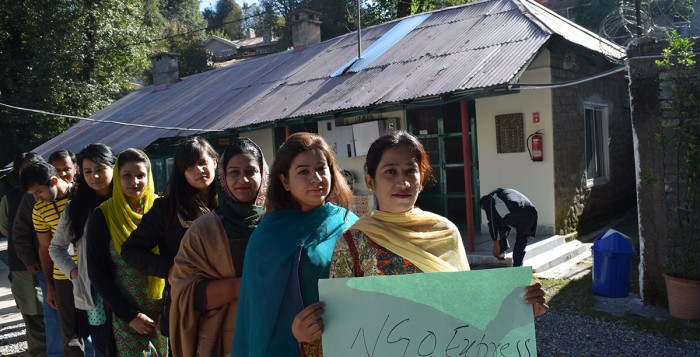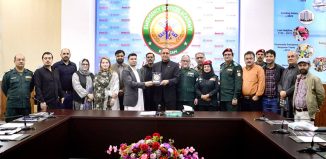Getting down to the Basics
A workshop on “Introduction to NGOs” was held from 19th to 22nd October, 2015 at O’Spring Estate Murree, and was designed to enhance the knowledge of interested aid workers on the basic tools and techniques required to operate in the aid sector. The workshop was facilitated by our consultant trainer, Syed Moazam Ali and our in-house trainer, Arshad Hussain.
In Pakistan Non Governmental Organizations (NGOs) play a vital role in providing indispensable services to diverse communities across the country. Thorough planning during the initial process of setting up an organization is crucial to develop an effective and professional organization that is able to meet the myriad of challenges it may face in implementing its programs.
Small-scale civil society organizations (CSOs) and NGOs often recruit professionals who are comparatively new to the field and are looking to gain more experience. While they are well aware of the local context, it is often observed that they are not fully oriented on critical knowledge and skills that are required to plan, implement and assess projects in the humanitarian and development sector. Due to limited funding and human capital, organizations are unable to provide detailed orientations or capacity building opportunities to its staff. Responding to this growing need of CSOs and NGOs, this four day training session was organized to build the capacity of the individuals working in the sector and equip them with the tools and techniques required for effective programming and expanded outreach to their targeted stakeholders. The training provides a multidimensional experience of learning through theory analysis and a behavioral study of different age groups.
The training focused on:
- Enabling participants to improve their understanding of the definition of an NGO and their history, mandate, and scope of work within Pakistan
- Enabling participants to share their experiences and acquire new skills pertinent to the NGO sector. Particular attention was paid to the emerging needs of communities and other current development issues
- Learning the history of humanitarian assistance and several recognized standards ensuring quality and accountability when responding to an emergency.
- Learning of the ethical and moral responsibilities of NGOs.
A total of seventeen participants took part in this Training on ‘Introduction to NGOs’. Sixty five percent of the participants were men while thirty five percent were women. All the participants of the training were employed for working at the grass root levels which made this training even more important and significant for them.
The main target of the workshop was to institutionalize aid organizations on the basics of the sector, therefore presidents of two of the village organizations, set up by Community World Service Asia in one of the communities it works in, also participated in the training so that their perspectives, being the most important stakeholders, were also taken in.
From the beginning till the end of the workshop, the trainers kept participants involved through interactive and innovative teaching methodologies. Their expertise and knowledge on the subject was thorough. Content brainstorming helped encouraged by the trainers helped in developing constructive discussions during group activities. Methodologies like presentations, debates, role play, videos and group activities used by facilitators were proved to be effective yet entertaining for the participants.
A participatory approach was adopted by the trainers as they provided equal opportunities to participants for taking in their feedback on individual basis in the various sessions conducted during the four days. One of the outdoor activities, the recycle exercise, was one that the participants particularly enjoyed as it not only enhanced their knowledge on the subject but also energized them. Participants learned a lot from outdoor activities which emphasized on environmental sustainability, behavior of donor and on being environmentally friendly.
The trainers noted that the level of understanding and participation of participants was exceptionally high which indicated that the training had been successful in achieving its goals. Before the training, participants confessed that they were curious about what the content of the training would be but later expressed they were satisfied as they felt that the training fully met their needs. They were all certain that they would take all that they had learnt through this workshop with them to improve existing policies and procedures in their organizations.
Participants Voices
 “From a learning point of view, topics like Introduction to NGOs and History of NGOs were new for me while topics like Project cycle ,Vision, mission, objectives, and mandate were very informative because I had no clarity on these subjects before the training. Though a project cycle already exists in my organization, I would like to implement the learnings of this training by further improving our project cycle and will focus more on objectives.” Abdul Saeed
“From a learning point of view, topics like Introduction to NGOs and History of NGOs were new for me while topics like Project cycle ,Vision, mission, objectives, and mandate were very informative because I had no clarity on these subjects before the training. Though a project cycle already exists in my organization, I would like to implement the learnings of this training by further improving our project cycle and will focus more on objectives.” Abdul Saeed










